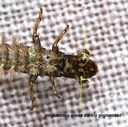Netspinning Caddisflies
Hydropsychidae
Classification
- Phylum: Arthropoda
- Subphylum: Hexapoda
- Class: Insecta
- Order: Trichoptera
- Suborder: Annulipalpia
- Superfamily: Hydropsychoidea
- Family: Hydropsychidae
Pronunciation
How to pronounce Hydropsychidae: /ˌhaɪdroʊˈsaɪkɪdiː/
These audio files are automatically generated. While they are not always 100% accurate, they are a good starting point.
Images






Summary
Hydropsychidae, or netspinning caddisflies, are a family of caddisflies known for their unique larval structure and feeding habits. They construct silk nets in flowing water to capture food and are significant in indicating the health of freshwater habitats.
Physical Characteristics
Hydropsychid larvae have a fully scleritized dorsum, branched gills on the ventral surface of their abdomens, and large anal prolegs equipped with hooks for grasping surfaces. They exhibit large, curved bodies visible without magnification.
Identification Tips
Identify by their unique curved bodies and their presence attached to rocks in freshwater streams.
Habitat
Freshwater streams and rivers, and occasionally the shorelines of freshwater lakes.
Distribution
Found worldwide, especially in freshwater environments.
Diet
Larvae feed on algae, diatoms, crustaceans, and immature aquatic insects caught in their silken nets.
Life Cycle
Larval stage spent entirely in fresh water; adults emerge from the aquatic environment.
Reproduction
Details on reproduction are not specified in the provided data.
Predators
Not specified in the provided data.
Conservation Status
Not specified in the provided data.
Ecosystem Role
They serve as an important indicator species for freshwater ecosystem health and contribute to the aquatic food web as both predators and prey.
Economic Impact
Not specified in the provided data.
Cultural Significance
Not specified in the provided data.
Health Concerns
Not applicable as this taxon does not pose health concerns.
Collecting Methods
- Light traps
- Surber samples
- Kick netting
Preservation Methods
- Ethanol
- Freezing
- Pinned specimens
Evolution
They are part of the Trichoptera order and closely related to Lepidoptera (caterpillars).
Similar Taxa
Misconceptions
Some may confuse them with other caddisflies or overlook their ecological importance as indicators of stream health.
Tags
- Hydropsychidae
- caddisflies
- freshwater
- indicators
- larvae
- net-spinning